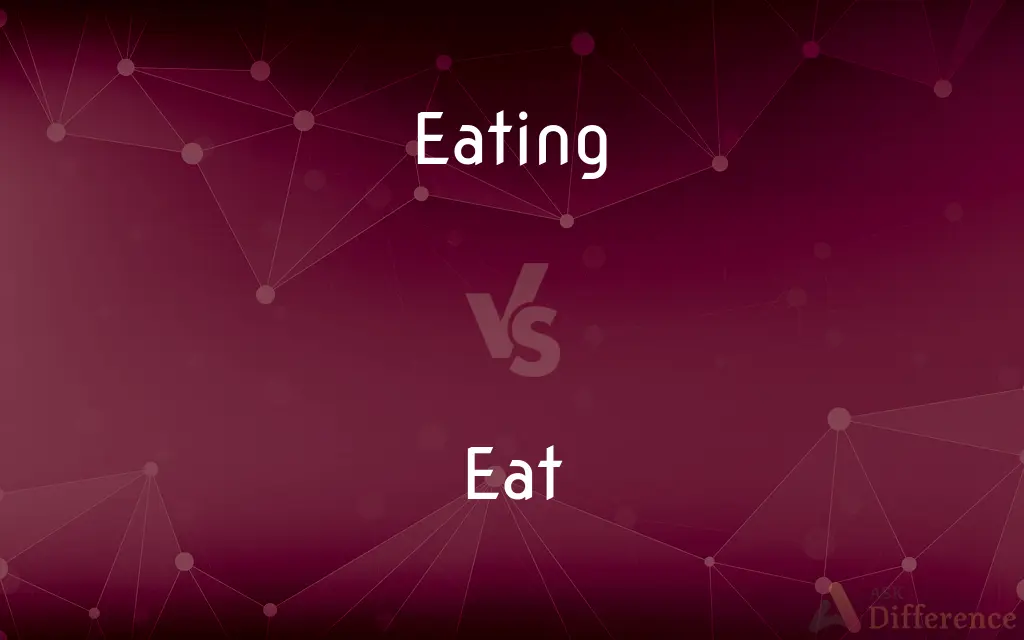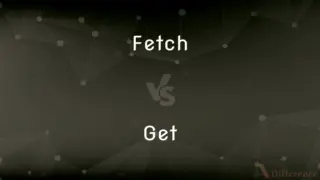Eating vs. Eat — What's the Difference?
By Fiza Rafique & Urooj Arif — Updated on April 21, 2024
Eating involves the process of consuming food, typically regularly and as part of daily sustenance, while "eat" is the action verb describing the act of consuming food.

Difference Between Eating and Eat
Table of Contents
ADVERTISEMENT
Key Differences
Eating is primarily the act of consuming food as part of nourishment, often seen as an ongoing activity throughout the day. On the other hand, "eat" is a verb that directly refers to the act itself, emphasizing the action rather than the process or context.
Eating can be described as an activity that encompasses various eating habits and preferences, highlighting social and cultural aspects. In contrast, "eat" focuses simply on the action, without implying any specific context or manner in which the food is consumed.
Eating is often used to refer to the process occurring at a specific time, like during meals—breakfast, lunch, or dinner. Whereas "eat" is used to describe the action in a more general sense, applicable to any instance of food consumption.
Eating can involve multiple senses, including taste, smell, and texture, pointing to an experience. On the other hand, "eat" describes the physical process of food intake, often devoid of these experiential nuances.
Eating is frequently discussed in the context of health and nutrition, emphasizing the importance of what and how we eat. In contrast, "eat" is more functionally oriented, focusing on the necessity of consuming food for survival and energy.
ADVERTISEMENT
Comparison Chart
Definition
The process or act of consuming food.
Verb describing the act of consuming food.
Usage Context
Refers to ongoing or regular activities.
Used to describe individual instances of consuming food.
Associated Concepts
Meals, habits, experiences, social settings.
Action, necessity, survival.
Verb Form
Gerund (noun form derived from a verb).
Base form of the verb.
Implication
Emphasizes the process and experience.
Focuses on the action itself.
Compare with Definitions
Eating
The ingestion of food by humans or animals.
Eating slowly can aid in better digestion.
Eat
To chew and swallow food.
He likes to eat quickly during breaks.
Eating
The activity of taking in food through the mouth.
Eating at the dining table is a family routine.
Eat
To take in food through the mouth and swallow for digestion.
Lions eat meat to survive.
Eating
The process of breaking down food in the body.
Eating a balanced diet contributes to overall well-being.
Eat
To consume food as part of a meal.
We eat lunch at noon.
Eating
An event characterized by consuming food.
The wedding featured a communal eating area.
Eat
To have a meal.
Let’s eat before we go to the cinema.
Eating
The act of consuming food for nourishment.
Eating regularly is crucial for maintaining health.
Eat
To destroy or consume gradually.
The acid ate away the metal.
Eating
Eating (also known as consuming) is the ingestion of food, typically to provide a heterotrophic organism with energy and to allow for growth. Animals and other heterotrophs must eat in order to survive — carnivores eat other animals, herbivores eat plants, omnivores consume a mixture of both plant and animal matter, and detritivores eat detritus.
Eat
Put (food) into the mouth and chew and swallow it
Eat up all your peas
He was eating a hot dog
She watched her son as he ate
Eating
Suitable for being eaten, especially without cooking
Good eating apples.
Eat
Light food or snacks
These make great party eats
Eating
Used in the ingestion of food, as at the table
Eating utensils.
Eat
To take into the body by the mouth for digestion or absorption.
Eating
Bred to be eaten.
Eating chickens; eating quails
Eat
To take in and absorb as food
A plant that eats insects.
A cell that eats bacteria.
Eating
Suitable to be eaten without being cooked.
Wait! That's not an eating apple.
Eat
To include habitually or by preference in one's diet
A bird that eats insects, fruit, and seeds.
Stopped eating red meat on advice from her doctor.
Eating
The act of tasking food; the act of consuming or corroding.
Eat
To destroy, ravage, or use up by or as if by ingesting
"Covering news in the field eats money" (George F. Will).
Eating
Something fit to be eaten; food; as, a peach is good eating.
Eat
To erode or corrode
Waves that ate away the beach.
An acid that eats the surface of a machine part.
Eating
The act of consuming food
Eat
To produce by eating
Moths ate holes in our sweaters.
Eat
(Slang) To absorb the cost or expense of
"You can eat your loss and switch the remaining money to other investment portfolios" (Marlys Harris).
Eat
(Informal) To bother or annoy
What's eating him?.
Eat
Vulgar slang To perform cunnilingus or anilingus on. Often used with out.
Eat
To consume food.
Eat
To have or take a meal.
Eat
To exercise a consuming or eroding effect
A drill that ate away at the rock.
Exorbitant expenses that were eating into profits.
Eat
To cause persistent annoyance or distress
"How long will it be before the frustration eats at you?" (Howard Kaplan).
Eat
To ingest; to be ingested.
Eat
(ambitransitive) To consume (something solid or semi-solid, usually food) by putting it into the mouth and swallowing it.
He's eating an apple. / Don't disturb me now; can't you see that I'm eating?
Eat
(intransitive) To consume a meal.
What time do we eat this evening?
Eat
To be eaten.
It's a soup that eats like a meal.
Eat
To have a particular quality of diet; to be well-fed or underfed (typically as "eat healthy" or "eat good").
Eat
To use up.
Eat
To destroy, consume, or use up.
This project is eating up all the money.
Eat
To consume (an exception, an event, etc.) so that other parts of the program do not receive it.
Eat
To damage, destroy, or fail to eject a removable part or an inserted object.
The VHS recorder just ate the tape and won't spit it out.
John is late for the meeting because the photocopier ate his report.
Eat
To consume money (or other instruments of value, such as a token) deposited or inserted by a user, while failing to either provide the intended product or service or return the payment.
The video game in the corner just ate my quarter.
Eat
To cause (someone) to worry.
What's eating you?
Eat
To take the loss in a transaction.
Eat
(ambitransitive) To corrode or erode.
The acid rain ate away the statue.
The strong acid eats through the metal.
Eat
To be very good; to rule; to rock.
You ate that performance!
Eat
(colloquial) Something to be eaten; a meal; a food item.
Eat
To chew and swallow as food; to devour; - said especially of food not liquid; as, to eat bread.
They . . . ate the sacrifices of the dead.
The lean . . . did eat up the first seven fat kine.
The lion had not eaten the carcass.
With stories told of many a feat,How fairy Mab the junkets eat.
The island princes overboldHave eat our substance.
His wretched estate is eaten up with mortgages.
Eat
To corrode, as metal, by rust; to consume the flesh, as a cancer; to waste or wear away; to destroy gradually; to cause to disappear.
Eat
To take food; to feed; especially, to take solid, in distinction from liquid, food; to board.
He did eat continually at the king's table.
Eat
To taste or relish; as, it eats like tender beef.
Eat
To make one's way slowly.
Eat
Take in solid food;
She was eating a banana
What did you eat for dinner last night?
Eat
Eat a meal; take a meal;
We did not eat until 10 P.M. because there were so many phone calls
I didn't eat yet, so I gladly accept your invitation
Eat
Take in food; used of animals only;
This dog doesn't eat certain kinds of meat
What do whales eat?
Eat
Use up (resources or materials);
This car consumes a lot of gas
We exhausted our savings
They run through 20 bottles of wine a week
Eat
Worry or cause anxiety in a persistent way;
What's eating you?
Common Curiosities
What health aspects are considered with eating?
Health considerations with eating include nutritional content, portion control, and balance of food groups.
Is "eat" used only in present tense?
"Eat" is the base form of the verb and can be used in various tenses with the appropriate auxiliary verbs.
Can "eating" be used as a verb?
Yes, "eating" is the gerund form of the verb "eat," used as a noun to describe the activity of consuming food.
How do cultural differences influence eating?
Cultural differences can influence meal types, eating schedules, and even the manner in which food is consumed.
What is the main difference between eating and eat?
Eating refers to the ongoing process of consuming food, whereas "eat" is the specific action of food intake.
Does "eat" have any non-literal meanings?
Yes, "eat" can be used metaphorically, as in "eating up time" meaning to use a lot of time.
Is it grammatically correct to say "I am eating"?
Yes, "I am eating" uses the present continuous tense to describe the current action of consuming food.
What verb tense is used with "eat" to describe a future action?
Future actions are described using "will eat" or "going to eat."
Why is eating considered a social activity?
Eating is often a communal activity involving family, social gatherings, or parties.
How does one describe good eating habits?
Good eating habits involve balanced meals, appropriate portion sizes, and regular meal times.
Share Your Discovery

Previous Comparison
Fetch vs. Get
Next Comparison
Roll vs. WrapAuthor Spotlight
Written by
Fiza RafiqueFiza Rafique is a skilled content writer at AskDifference.com, where she meticulously refines and enhances written pieces. Drawing from her vast editorial expertise, Fiza ensures clarity, accuracy, and precision in every article. Passionate about language, she continually seeks to elevate the quality of content for readers worldwide.
Co-written by
Urooj ArifUrooj is a skilled content writer at Ask Difference, known for her exceptional ability to simplify complex topics into engaging and informative content. With a passion for research and a flair for clear, concise writing, she consistently delivers articles that resonate with our diverse audience.
















































